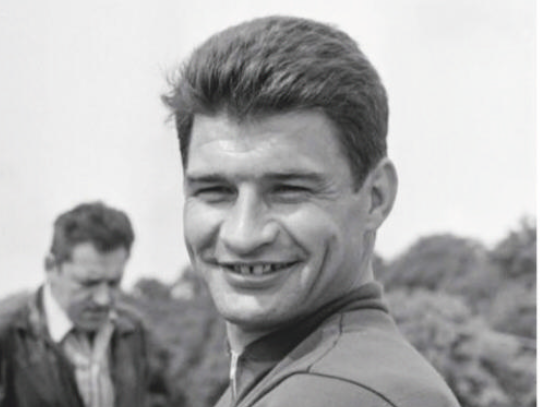The more Tours he lost, the more the crowds liked him and the more he earned. At the height of his celebrity, in the mid-1970s, almost half of respondents to one poll made him their first choice as a dinner guest. In 1974 alone more than 4,000 articles were written about him, besides university theses and sociological studies.
他輸?shù)谋荣愒蕉啵藗兙驮较矚g他,他就掙得越多。20世紀(jì)70年代中期是他最有名的時候,幾乎一半?yún)⑴c一項(xiàng)民調(diào)的人都選他作為晚餐客人的首選。僅僅在1974年一年,除了大學(xué)論文和社會學(xué)研究之外,就有超過4000篇關(guān)于他的文章。
He lent his name to sports bikes, and given half a chance would stand in supermarkets shouting "Just the right bike for you, sir!" Later, as a national treasure, he had a rose named after him, and appeared along the route of the Tour in yellow outfits and with trinkets in his hands, cheered by all who saw him. This adulation came not simply because he failed, but because of the manner of his failing.
他把自己的名字借給運(yùn)動自行車,只要有一點(diǎn)機(jī)會,他就會站在超市里喊道,“這就是你想要的自行車,先生!” 后來,作為國家寶藏,他的名字被命名成一種玫瑰,他穿著黃色的服裝,手里拿著小飾品,出現(xiàn)在巡演路線上,所有看到他的人都?xì)g呼起來。這種崇拜不僅僅是因?yàn)樗×耍沂且驗(yàn)樗〉姆绞健?/p>

He did not get up each morning with the thought of winning. He did not think of winning at all. His manager complained that he was always in a daydream, and it was true. Everything that was happening to him was marvelous enough. His memoir was called "La gloire sans maillot jaune", glory without the jersey, which in the end he didn't need. Eight times he had got within touching distance, and lost them all. But he could still say, as he often did, "Look how close I came!"
他每天不是帶著獲勝的想法起床的。他就沒想過贏這回事兒。他的經(jīng)理一職抱怨他總是做白日夢,而且這是真的。發(fā)生在他身上的事情已經(jīng)足夠神奇了。他的回憶錄名為《沒有黃色領(lǐng)騎衫的榮耀》,沒有這件球衣的榮耀,最后他也不需要了。八次比賽中他都對第一名觸手可得,卻都沒拿到。但是他仍然會說,就像他經(jīng)常做的那樣,“就差一點(diǎn)!”
譯文由可可原創(chuàng),僅供學(xué)習(xí)交流使用,未經(jīng)許可請勿轉(zhuǎn)載。












